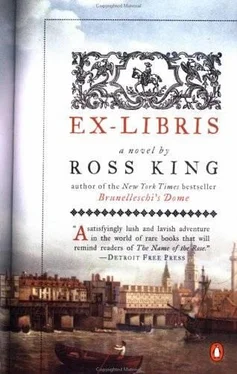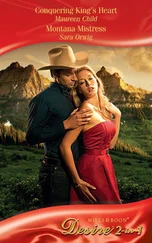I was tempted to stand up and expose the grotesque canard, but everyone else seemed to have fallen under Pickvance's spell. He often started bids at a penny or two, but they quickly rose to a shilling, then to a pound, and within a minute or two the mallet would be resounding and our perverse auctioneer shouting in triumph: 'Sold! For thirty shillings! To the gentleman in the second row!'
So appalled was I by this hoax that two or three lots had been sold before I realised what type of volume was being offered. The first ones had been bound collections of political or religious tracts, including pamphlets by such persecuted sects as the Ranters, the Quakers and, most numerous of all, the Bunhill Brethren-works, in other words, that would have run foul of the Blasphemy Act passed by Parliament ten years earlier. No respectable dealer would touch them for this very reason, at least no dealer who wished to remain in business for long, because the Secretary of State regularly sent his searchers into the shops to root out and burn whatever blasphemous or seditious books and pamphlets they might lay their hands on.
So this was the reason, I supposed, why Dr. Pickvance held his auction in the Golden Horn-to escape the eyes of the searchers. For obviously none of his wares had been licensed by the Secretary of State. Yet this lack of sanction failed to deter the bidding one bit. I watched in amazement as the black-garbed sectarians competed for the pamphlets against a couple of smirking, rosecake-scented Cavaliers who appeared to regard even the most lubricious of the Bunhill Brethren's exhortations as some sort of joke. But I supposed the searchers were no more likely to enter Alsatia than were the bailiffs and catchpoles, so we were safe-if that was the word-from the graspings of the law.
Soon the lots grew more shocking, the bidding even fiercer. After thirty minutes the lots began to include hastily executed woodcuts and engraved prints depicting in the most vivid detail unchaste performances by masters with their kitchen-maids, or between ladies and their coachmen and gardeners. Others consisted of slim volumes of decidedly amateur verse describing a series of similar partnerships, along with prose volumes of specious medical authority illustrating inventive but surely impossible sexual postures that guaranteed, to the acrobats who attempted them, delights of a barely credible measure.
As each lot was cried, Dr. Pickvance or Mr. Skipper would wave the prints about for general observation, like frantic puppet-masters. Or else Pickvance would read aloud passages from the books in his high-pitched voice, eyes going glassy as he did so, beads of sweat standing out on his brow as Mr. Skipper stood meekly aside, his own face turning a deep crimson.
I had seen and heard enough. There could be nothing of relevance to my quest in these crude pages. The next ten or twelve lots dealt with the sort of occult literature I had seen at Pontifex Hall, but these were in much poorer repair and bound in inferior leather, mostly calfskin, and the ex-libris of Sir Ambrose Plessington would not, I thought, be found among them. I prepared to leave. But no sooner had I scraped my chair and risen halfway to my feet than I heard Pickvance crying a new lot, one similar, it seemed, to the previous couple of dozen.
'Gentlemen! You see before you Lot 66,' he called in his hectoring cadence, 'from the famous collection of Anton Schwarz von Steiner!'
I started at the name, which I knew I had heard before. I watched the volume flourish in Pickvance's hand, whose fingers looked strangely clawed, as if the digits were malformed. Then I remembered. I had been ascending from the crypt at Pontifex Hall, with Alethea, two steps ahead of me, describing Sir Ambrose's exploits, how he once negotiated for the Holy Roman Emperor the purchase of the entire library of an Austrian nobleman, a renowned collector of occult literature named-I was certain-von Steiner.
Bids on Lot 66 had started at ten shillings. Two men in particular were bidding against each other: one of them in the front row, the other two or three seats to my left. Pickvance was soliciting higher and higher offers. Twenty shillings… thirty… thirty-five…
My spit had dried up and I felt a shiver creep up my backbone like a bead of mercury. I squinted hard at the volume, which Mr. Skipper held aloft as he paraded up and down the platform. What were the chances, given Pickvance's appalling record so far, that it had actually been part of the Schwarz collection, much less in the Emperor's library? But a link, however tenuous, had been forged, something that might connect Sir Ambrose Plessington to the Golden Horn, or at least to Dr. Samuel Pickvance.
I leaned forward in my chair and licked my lips. The room seemed to have gone impossibly silent. The man in my row had ceased bidding. Pickvance raised his mallet.
'Thirty-five shillings, going once… going twice…'
***
By the time the last of the three hundred lots were sold the bells of St. Bride's had rung four o'clock. I stumbled outside, blinking and squinting in the brilliant sunlight, bumped and pushed on the tide of the departing auction-goers, with whom I now felt, after so many hours together, an unwelcome kinship. To escape them I walked down to the Fleet and stood for a few moments on the bank, watching the water flex and gurgle as the tide pooled slowly inwards. A slick of oil shivered and coalesced on the surface, a perfect spectrum of colour. Then, as the voices finally subsided behind me, I reached into my coat-tails.
Lot 66 was, by the standards of this particular auction, a rather distinguished volume: actual morocco with strong stitching, its rag-paper pages unscathed by either damp or book-lice. It proved to be an edition of Cornelius Agrippa von Nettesheim's Magische Werke published in Cologne in 1601 and edited by someone named Manfred Schloessinger. I knew little about the work other than that it was a translation into German of De occulta philosophia , a book of spells in which one finds, among other things, the first ever reference to the word 'abracadabra'. It had cost me almost five pounds, which was far too much, of course. I wouldn't be able to sell it for even two pounds, let alone five. But what interested me wasn't the title or the author but the ex-libris pasted to the inside cover. It incorporated a coat of arms, a motto-' Spe Expecto '-and a name engraved beneath in a heavy Gothic script: Anton Schwarz von Steiner.
Of course, the ex-libris may not have been authentic. A bookseller learned to distrust these little tokens of identity. One cannot judge a book either by its cover, as the saying goes, or by its ex-libris. This one, for example, might have been soaked off another book-one that had belonged to von Steiner-and then pasted on to the inside cover of an otherwise undistinguished copy of Agrippa's Magische Werke . Unscrupulous booksellers had been known to resort to such tactics in order to increase the value of a book-something I would not have put past Pickvance. Or else the bookplate might not have been von Steiner's, but a forgery instead. And if this was the case, I wouldn't recognise the fraud unless and until I saw a true example of von Steiner's ex-libris, which didn't seem likely in the near future.
On the other hand, I told myself, it was well known how the contents of the Imperial Library in Prague had been pillaged and dispersed during the Thirty Years War. What was missed by the soldiers looting Prague Castle at the start of the war had been scooped up by Queen Christina of Sweden as it ended three decades later. So it was possible that the ex-libris was authentic and that the volume had found its way to England. It could have been brought over by Sir Ambrose, who would have been acquainted with it through his dealings with the Holy Roman Emperor. Possibly the Englishman had been unscrupulous in his dealings with Rudolf and had kept certain volumes for his own private collection, which in time must almost have rivalled the Emperor's own. But if this was the case, why was the volume not at Pontifex Hall? Why did it not show his ex-libris on the front pastedown? And if it had been pillaged or lost like many of the others, why had Alethea made no mention of it?
Читать дальше












